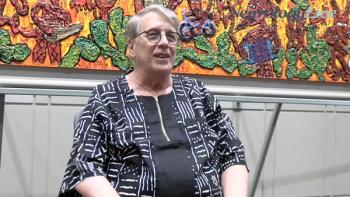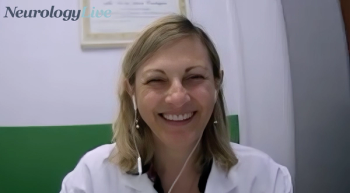
Research indicated that up to 46% of patients diagnosed with presumed autoimmune limbic encephalitis tested negative for all currently identified central nervous system antigens.

Isabella Ciccone, Content Associate, NeurologyLive®, has been with the team since September 2022. Follow her on X @iciccone7 or email her at [email protected]

Research indicated that up to 46% of patients diagnosed with presumed autoimmune limbic encephalitis tested negative for all currently identified central nervous system antigens.

Researchers detected annual changes in patients with preataxic and early ataxic spinocerebellar ataxia in brain MRI imaging, clinical scores, gait parameters, and retinal thickness.

The professor of human genetics at the University of Miami discussed the significance of various genetic factors in Alzheimer risk and highlighted ongoing research, therapeutic challenges as well as the need for global collaboration. [WATCH TIME: 10 minutes]

Recent findings showed that treatment with satralizumab was likely associated with a reduction in the concomitant use of immunosuppressive therapies in neuromyelitis optica spectrum disorder.

The professor of human genetics at the University of Miami talked about the Alzheimer's Disease Sequencing Project which aims to provide diverse genetic data to identify therapeutic targets for Alzheimer disease. [WATCH TIME: 10 minutes]

The Jerold B. Katz professor of neurology and neuroscience at Weill Cornell Medicine talked about a recent study that revealed patients who appeared unresponsive to verbal commands in vegetative or minimally conscious states retained high cognitive function. [WATCH TIME: 6 minutes]

According to a recent announcement, Larimar Therapeutics reported that all 7 sites of the open-label extension study were activated for assessing nomlabofusp in Friedreich ataxia.

In a recent analysis, patients with chronic inflammatory demyelinating polyneuropathy who started their initial treatment later experienced a worsening of the disease course.

The director of the Cleveland Lou Ruvo Center for Brain Health at Cleveland Clinic discussed new diagnostic techniques that show promise for advancing the understanding of brain pathologies like Alzheimer and Lewy Body diseases. [WATCH TIME: 3 minutes]

Acute clinical events with stable MRI were more likely among patients with multiple sclerosis who had longer disease duration, received highly effective disease-modifying therapies, and were presented with fatigue.

Prior to this, the FDA granted regenerative medicine advanced therapy designation to the cell therapy for refractory stiff-person syndrome.

The director of the Cleveland Lou Ruvo Center for Brain Health at Cleveland Clinic talked about challenges of accurately diagnosing dementia with Lewy bodies as well as new methods that show promise in guiding treatment. [WATCH TIME: 3 minutes]

Findings suggest that autoimmune diseases including neuromyelitis optica spectrum disorder and myasthenia gravis may also benefit from BCMA-CD19 bispecific CAR-T therapy.

The chair of Allegheny Health Network’s Neurosciences Institute talked about its comprehensive center that integrates multidisciplinary resources and technology to provide quality care for patients with chronic neurologic conditions. [WATCH TIME: 5 minutes]

The CEO and cofounder at Advanced Brain Monitoring talked about a study presented at AAIC 2024 that explored the use of EEG biomarkers to differentiate between Alzheimer disease and frontotemporal dementia.

The CEO and cofounder at Advanced Brain Monitoring talked about how the early diagnosis of frontotemporal dementia is often mistaken for Alzheimer disease, but advancements in neuropsychological assessments and biomarker identification may improve accuracy. [WATCH TIME: 4 minutes]

Epstein-Barr Virus-specific T cells in multiple sclerosis (MS) showed significant autoreactivity to central nervous system antigens, indicating a potential mechanism for MS-related damage.

The CEO and cofounder at Advanced Brain Monitoring discussed using EEG-based biomarkers to identify early markers that predict cognitive decline and aid in differential diagnosis for neurodegenerative diseases. [WATCH TIME: 4 minutes]

Results from a survey study suggest the burden of epilepsy is high in sexual and gender minority patient populations, who already experience high risk of stigmatization, discrimination, and poor health outcomes.

Long-term treatment with Clene Nanomedicine’s CNM-Au8 was associated with improved survival among patients with amyotrophic lateral sclerosis from 2 clinical trials.

Earlier this year, IDP-023 received fast track designation by the FDA for the treatment of patients with multiple myeloma and non-Hodgkin lymphoma.

The CEO and cofounder at Advanced Brain Monitoring talked about how exploring electroencephalography patterns can help differentiate between Alzheimer disease, Lewy body dementia, and frontotemporal dementia. [WATCH TIME: 3 minutes]

Catch up on any of the neurology news headlines you may have missed over the course of July 2024, compiled all into one place by the NeurologyLive® team.

A duo of experts highlighted the need for further studies on the exploration of how exposure to wildfire particulate matter impacts neurodegenerative diseases. [WATCH TIME: 2 minutes]

The director of the Brain Health Observatory at the University of Southern California discussed how blood tests for Alzheimer disease could significantly reduce diagnostic wait times and improve treatment monitoring. [WATCH TIME: 4 minutes]

Treatment of the first randomized patient with preclinical Alzheimer disease in the phase 2b ReTain trial assessing JNJ-2056 is anticipated in the third quarter of 2024.

The consultant neurologist at Fondazione Don Carlo Gnocchi ONLUS stressed how new clinical trial designs for cervical dystonia should incorporate more flexible and patient-centered approaches, including new measurement scales and the use of technology. [WATCH TIME: 5 minutes]

The president at Fasikl and the Laverne and Joyce Rider professor of neurology at the University of Kansas Medical Center talked about results from a pilot study assessing the Felix Neural AI wristband in patients with essential tremor. [WATCH TIME: 4 minutes]

Using plasma p-tau217 shows promise as an effective, less invasive pre-screening method for identifying amyloid-β positive individuals in Alzheimer disease clinical trials.

The consultant neurologist at Fondazione Don Carlo Gnocchi ONLUS talked about a recent study that examined the varying methods and results of clinical trials assessing the duration and efficacy of botulinum toxin treatment in cervical dystonia. [WATCH TIME: 7 minutes]